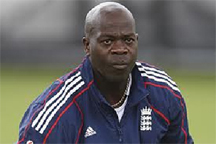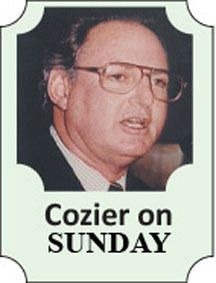It is an artificiality devised by Frank Duckworth and Tony Lewis, a couple of high profile English statisticians, to ensure that there is a definite result to limited overs matches interrupted by weather or other circumstances.
The calculations are complex and can constantly change, based as they are on wickets remaining and overs to play for the team batting second.
They can be as confusing as logarithm to the uninitiated. Few in the game have got their heads around it but it has been grudgingly accepted as a necessary evil.
There is not a team that hasn’t been devastated by it at some time. Few have felt frustration quite as sharply as the West Indies in their decisive qualifying group match in the Champions Trophy against South Africa in Cardiff on Friday – unless it was South Africa themselves in the 2003 World Cup on home territory.

With the same won one, lost one record as South Africa but behind on the determining net run-rate, the West Indies’ goal was clear – win outright and join the youthful, confident, unbeaten Indians in the semi-final or fail and head home early.
They had got themselves in such a predicament by their lifeless performance against India three days earlier, conceding an utterly one-sided match by eight wickets with 10.5 overs remaining.
They were weak in all three departments and their net run-rate plunged disastrously.
They were a different unit on Friday; their body language revealed their mood, bearing the mark of “cornered tigers”, as Imran Khan said of his 1992 Pakistan World Cup champions when they seemed down and out.
Set an imposing challenge by South Africa’s 230 for six from their 31 overs after a start delayed by early morning and early afternoon rain, the West Indies entered the 27th over from medium-pacer Ryan McLaren 186 for five, four runs ahead of the Duckworth/Lewis par score.
Off the first ball, a high, swirling catch from Kieron Pollard’s hefty outside edge was superbly caught, charging in from third man, by Dale Steyn whose fast bowling had already made an impact in his first match of the tournament.
The wicket brought the D/L scores back level. Still, just a single was needed to push the West Indies ahead again; even as Darren Sammy walked to the wicket, the rain had returned in the evening gloaming.
As new ODI captain Dwayne Bravo and his predecessor waited in the middle for the dreaded summons for the covers from umpires Steve Davis and Rod Tucker, the television images of manager Richie Richardson, coach Ottis Gibson and other players on the West Indies’ balcony reflected the anguish.

Had the end come five minutes earlier or five minutes later, the victory would have been West Indies’. That was as cruel as it was.
Only one member of the South African squad, coach Gary Kirsten, was in their team that endured similar Duckworth-Lewis agony in the 2003 World Cup on home soil. It has become an unwanted part of their game’s folklore; all those on the field would have been aware of the significance of Friday’s result.
Ten years ago in Durban, through the increasingly heavy rain, the flashing lights on the scoreboard showed South Africa 229 for six after 45 overs, level with Sri Lanka under the D/L method.
Off the field, their coach and captain reckoned it meant they were home and through to the semi-finals, providing they didn’t lose another wicket. Consequently, Mark Boucher carefully blocked the next three balls before umpires Steve Bucknor and Srinivasa Venkataraghavan called on the covers; play was soon abandoned.
But the South Africans had miscalculated, a fault that has befallen other teams since, among them the West Indies in an ODI against England in Georgetown in 2009 among them. In South Africa, Sri Lanka advanced instead.
Recriminations were instant; Shaun Pollock was dismissed as captain. If they could empathise with the West Indies’ anguish on Friday, they would feel no sympathy. For them, it was, finally, release from painful memories.
The West Indies’ distress might well last as long. Nine years after winning the Champions Trophy as complete outsiders, their opportunity of repeating was snatched from them in the space of one ball.
For the abbreviated contest, South Africa were predictably sent in by Dwayne Bravo. Even without two of their premier batsmen, Graeme Smith and Jacques Kallis, absent from the tournament, they compiled an imposing 230 for six at a rate of 7.41 runs an over.
Invitingly short straight boundaries at the Swanlec Stadium accounted for eight sixes and several of the 14 fours.
The pursuit made for a tense, exciting cricket for the hardy spectators braving the uncomfortable weather in the open stands, as many waving their varied West Indian flags as those with South Africa’s.
The West Indies, the reigning World Twenty20 champions with several batsmen honed in the art of the short-format game in the Indian Premier League (IPL), were well equipped for the task.
The understandable notion was that a successful chase depended primarily on the hefty willow of Chris Gayle, Twenty20’s most devastating enforcer.
For South Africa, the key man was Steyn, contemporary cricket’s No.1 fast bowler, the side strain that eliminated him from earlier matches now mended.
The stands hummed in anticipation at the prospects. It was unforgettable drama.
Every West Indian batsman contributed to the quest for victory; none could emulate left-hander Colin Ingram’s 73 off 63 balls, with two sixes and six fours, that gave the South African innings its vital, initial momentum.
No West Indian bowler was taken for fewer than six runs an over; in Steyn and left-arm spinner Robin Peterson South Africa had two at five and a half.
Steyn removed Johnson Charles and Marlon Samuels for 48 from 38 balls just when he was at his most dangerous, Peterson claimed a referred lbw against the busy left-handed Devon Smith, in for Ramnaresh Sarwan, for 30 off 29 balls.
Gayle thumped one typically power-packed six and five fours but was caught at point for 36 in the 12th over. Samuels, as usual, used some time to move from first to fifth gear, needing 19 balls to get into double figures, just 19 more to add another 18 before Steyn plucked out his middle-stump.
He was culpable in the run out of Darren Bravo. The left-hander’s two wristy boundaries off his seven balls and the silky stroke that led to his demise on Hashim Amla’s boundary-saving slide on the midwicket boundary and swift return promised to develop into something special to add to his dazzling, one-handed catch at midwicket that sent back AB deVilliers, South Africa’s linchpin.
Samuels fell at 162 in the 24th over but Pollard and captain Bravo kept West Indian chances burning.
The weather gradually closed in yet Pollard and Bravo are cricketers, not meteorologists, and had to keep aiming at the 231 target until the rain inevitably arrived to so harshly spoil the match and the West Indies hopes. They will never have a chance again in the Champions Trophy as the International Cricket Council (ICC) has decided that there will be none after this.





